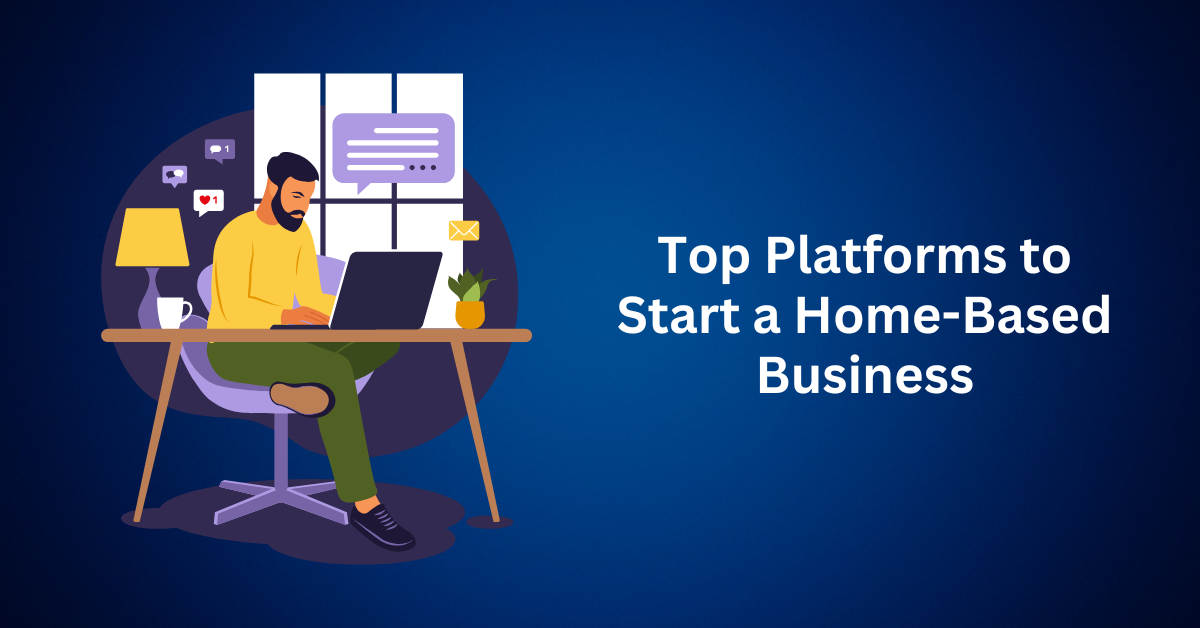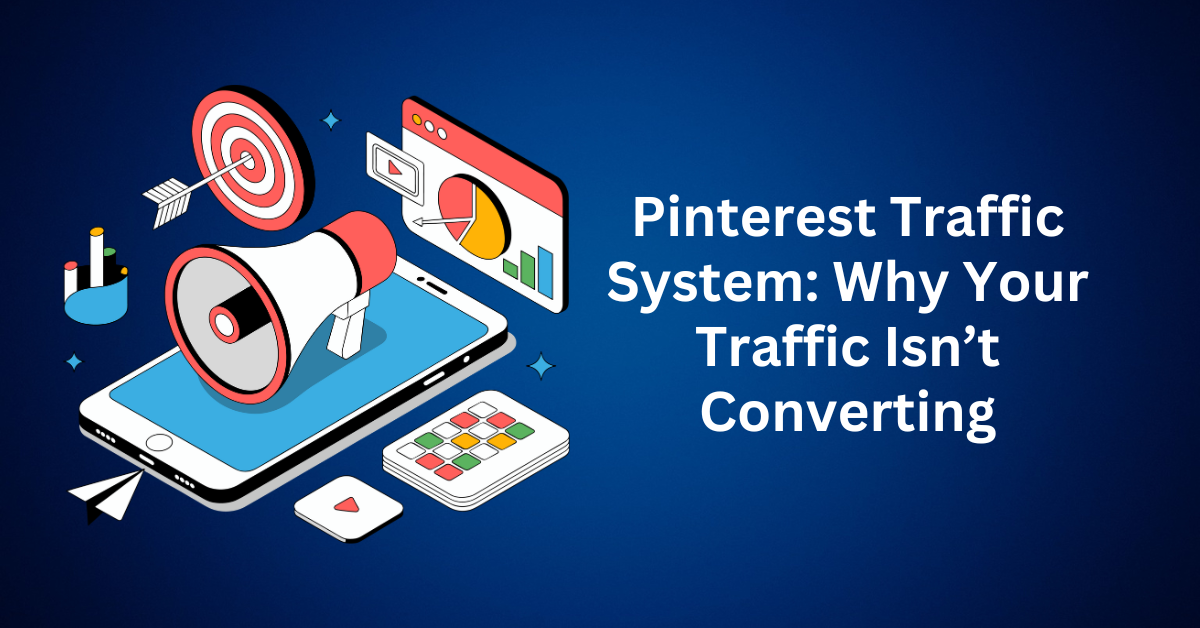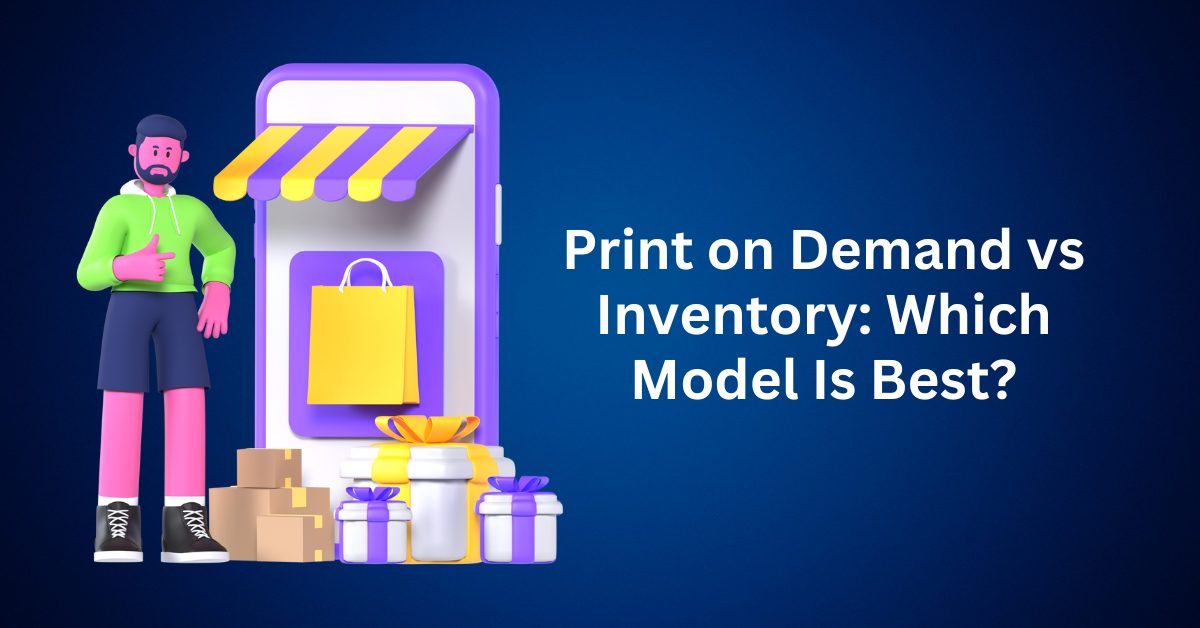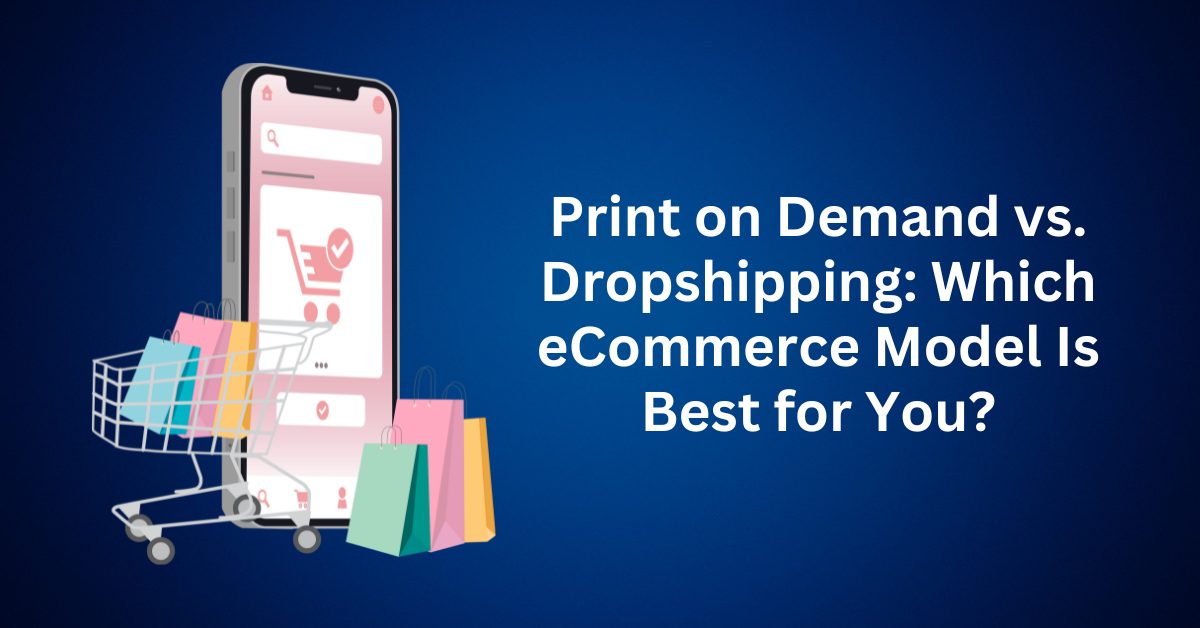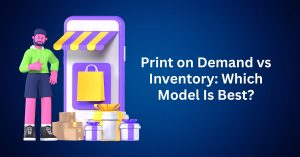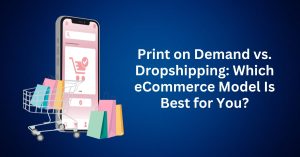Starting a home-based business has never been easier. Thanks to digital tools and online platforms, anyone can turn their skills, creativity, or knowledge into a profitable venture without ever leaving home. The real challenge, however, isn’t whether opportunities exist—it’s identifying the right platform that truly aligns with your business goals.
In this guide, we’ll take a closer look at the best platforms for home-based businesses, ranging from eCommerce and freelancing to online teaching and content creation.

Table of Contents
ToggleBest Print-on-Demand Home-Based Business Platforms for Creative Entrepreneurs
If you’ve ever dreamed of turning your artwork, photography, or designs into sellable products, print-on-demand (POD) is one of the simplest and most profitable business models to start from home. Unlike traditional retail, you don’t need to buy stock upfront or manage shipping. Instead, you upload your design, choose a platform, and your POD partner takes care of printing, packing, and delivery whenever a customer places an order.
This low-risk model makes it ideal for side hustlers, independent creators, and even established brands looking to expand their product lines. However, the key to success lies in choosing the right POD platform that aligns with your goals. To help you make an informed decision, we’ll now compare three of the most popular options: Printify, Printful, and Redbubble.
Why Choose Print-on-Demand for Your Home-Based Business?
Before diving into the platforms, let’s cover why POD is such an attractive model for creators and entrepreneurs:
- No upfront inventory costs – You only pay for products after a customer orders.
- Scalable business model – Add as many products or designs as you want without managing stock.
- Creative freedom – Turn original designs into apparel, mugs, posters, phone cases, or even home décor.
- Hands-off fulfillment – Providers handle printing, shipping, and logistics so you can focus on design and marketing.
Now, let’s break down the top POD platforms that can help you launch or grow your creative business.
1. Printify – Flexible Fulfillment & Competitive Pricing
Best for: Independent creators, side hustlers, and entrepreneurs who want flexibility and profit margins.
To begin with, Printify has built its reputation as one of the most versatile POD platforms, as it connects sellers with a large network of global print providers. As a result, you gain flexibility in production, pricing, and shipping speed. Furthermore, by using their Product Creator tool, you can easily design products, generate professional mockups, and publish them directly to your eCommerce store or marketplace.
Key Features of Printify:
- Over 1,300 customizable products (from T-shirts and hoodies to mugs and home décor).
- A diverse fulfillment network offering both local and international printing partners.
- Lower base prices compared to competitors, giving sellers higher profit margins.
- Seamless integrations with platforms like Shopify, Etsy, WooCommerce, and eBay.
If you want maximum control over costs and the ability to scale quickly, Printify is an excellent choice.
2. Printful – Premium Quality & Branding Options
Best for: Entrepreneurs or established brands who prioritize quality, consistency, and professional branding.
Unlike Printify, which outsources production, Printful operates its own in-house fulfillment centers worldwide. This means you get reliable quality control, consistent product standards, and often faster delivery times. Printful also goes beyond just printing—it offers advanced branding features like custom packaging, labels, and inserts to create a polished, professional unboxing experience for your customers.
Key Features of Printful:
- A wide range of products, including apparel, accessories, posters, and home goods.
- Global fulfillment centers ensure consistent quality and reliable delivery.
- Branding extras such as custom packaging, labels, and pack-ins for a premium customer experience.
- Integrations with major platforms like Shopify, WooCommerce, Squarespace, and Amazon.
If you’re building a serious business or want your brand to look polished and professional from day one, then Printful is the stronger choice.
3. Redbubble – Built-in Marketplace for Artists
Best for: Artists who want passive income and exposure without managing an online store.
Redbubble takes a different approach from Printify and Printful. Instead of integrating with your own website, Redbubble is a global marketplace where independent artists upload their designs. Customers then browse and buy directly from the marketplace, while Redbubble handles printing, fulfillment, customer service, and payouts.
This makes it incredibly beginner-friendly, and it’s perfect if you don’t want to manage your own storefront or marketing campaigns.
Key Features of Redbubble:
- Wide product selection including apparel, stickers, stationery, and home décor.
- Built-in traffic and exposure from Redbubble’s global audience.
- 100% hands-off fulfillment—no need to handle shipping or customer service.
If your goal is passive income and brand exposure, Redbubble is one of the easiest POD platforms to get started with.

Best eCommerce and Online Store Platforms for Home-Based Businesses
When starting a home-based business, one of the most important decisions you’ll make is choosing the right eCommerce platform. After all, the platform you select not only determines how your store looks but also shapes how customers shop and how easily your business can grow. For example, while all-in-one solutions like Shopify streamline the process, flexible plugins like WooCommerce give you more control. Each option, however, comes with its own unique advantages.
With that in mind, let’s break down the most popular eCommerce platforms and explore who they’re best suited for.
1. Shopify – Scalable Online Stores With POD Integrations
Best for: Business owners who want to build a branded online store and scale beyond marketplaces.
In recent years, Shopify has emerged as the go-to eCommerce platform for entrepreneurs who value simplicity without sacrificing power. With its intuitive drag-and-drop store builder, seamless built-in payment processing, and advanced AI-driven tools, it not only streamlines setup but also enables you to launch a professional online shop with ease.
What makes Shopify especially attractive is its seamless integrations with print-on-demand (POD) services like Printify and Printful, which allow creators to sell custom products without managing inventory.
Key Features of Shopify:
- Intuitive storefront builder with customizable themes
- Secure Shopify Payments and built-in fraud protection
- Multichannel sales through social media, marketplaces, and POS systems
- Growing ecosystem of apps for marketing, SEO, and automation
If you’re serious about building a recognizable brand rather than relying only on marketplaces, Shopify provides everything you need to scale.
2. Etsy – Marketplace for Handmade and Creative Goods
Best for: Beginners selling handmade crafts, vintage finds, or POD designs.
Etsy is one of the easiest entry points for home-based business owners, especially for those selling handmade products, digital downloads, or print-on-demand merchandise. Unlike Shopify, you don’t have to build traffic from scratch—Etsy provides access to millions of active shoppers searching for unique and personalized items.
While the platform is user-friendly, keep in mind that Etsy charges listing and transaction fees, which can add up as your sales volume grows.
Key Features of Etsy:
- Massive built-in audience of buyers
- Simple listing process for products
- Wide range of niches, from jewelry and crafts to digital art
Etsy is an excellent starting point if you want to validate your product ideas without building a full website.
3. Amazon FBA – Scale With Prime Logistics
Best for: Sellers with proven products who want to reach a global audience quickly.
Amazon FBA (Fulfillment by Amazon) is a powerful option for entrepreneurs because it allows you to store your products in Amazon’s warehouses, where the company takes care of shipping, customer service, and returns. In addition, this program gives your products the coveted Prime badge, instantly making them more attractive to millions of shoppers.
The biggest advantage of Amazon FBA is trust—customers already recognize and rely on Amazon’s fast delivery and reliable service. On the other hand, the platform is also highly competitive, and storage or fulfillment fees can quickly reduce profit margins.
Key Features of Amazon FBA:
- Access to millions of Amazon shoppers worldwide
- Prime eligibility for faster delivery and higher conversion rates
- End-to-end storage, packing, and shipping handled by Amazon
If your product is already validated and you’re ready to scale fast, FBA can be a powerful way to grow.
4. WooCommerce – Flexible WordPress eCommerce
Best for: WordPress users who want complete control and customization.
WooCommerce is a free plugin that transforms any WordPress site into a fully functional online store. Unlike Shopify or Etsy, WooCommerce gives you full ownership of your website and customer data, making it one of the most flexible options available.
The plugin supports a wide range of add-ons for payment gateways, subscriptions, memberships, and even print-on-demand integrations like Printify. While WooCommerce requires more hands-on setup than Shopify, it rewards you with maximum flexibility.
Key Features of WooCommerce:
- 100% free plugin with optional paid add-ons
- Complete customization of design and functionality
- Integration with hundreds of extensions for SEO, marketing, and POD
- Direct connection to Printify and other eCommerce tools
WooCommerce is perfect for entrepreneurs who value independence and want to build a long-term eCommerce business on WordPress.

Best Service Home-Based Business Platforms for Freelancers and Entrepreneurs
Not every home-based business has to revolve around selling physical products. For many people, the fastest way to start earning from home is by offering services based on existing skills. Thanks to digital platforms, it’s easier than ever to connect with clients who need help with writing, design, marketing, tech, or even practical local services like cleaning and moving.
If you’re looking to launch a service-based business with little upfront investment, here are the top platforms to consider.
1. Fiverr – Quick-Start Freelancing for Beginners
Best for: Freelancers and side hustlers who want to start small and find clients quickly.
Fiverr is one of the most popular platforms for new freelancers, and for good reason. It allows you to create “gigs” or service packages in areas such as content writing, graphic design, SEO, video editing, and digital marketing. Because startup costs are minimal, it serves as an accessible entry point for anyone looking to test the waters of freelancing.
Moreover, the platform boasts millions of active buyers, which means you don’t have to chase clients—they come directly to you. With the right positioning and positive reviews, Fiverr can gradually evolve from a side hustle into a steady and reliable income stream.
Key Features of Fiverr:
- Service packages that make it easy to set clear pricing
- A massive, built-in pool of clients worldwide
- Strong demand for creative, tech, and digital services
- Easy-to-use platform for managing projects and payments
Fiverr is ideal if you’re new to freelancing and want to build your portfolio while earning money quickly.
2. Upwork – Global Marketplace for Professional Services
Best for: Professionals seeking long-term contracts, recurring projects, and global clients.
Upwork is one of the largest freelancing platforms in the world, connecting skilled professionals with businesses in need of services. Unlike Fiverr, which focuses on one-off projects, Upwork is better suited for freelancers looking for consistent, contract-based work.
From web development and consulting to design, copywriting, and digital marketing, Upwork offers opportunities across almost every professional niche. The platform also uses an escrow system, so payments are secure and released only when both parties are satisfied.
Key Features of Upwork:
- Access to a broad global client base across multiple industries
- Escrow protection for safe and timely payments
- Flexible schedule—you choose when and how much you work
- Ability to build long-term client relationships
If you’re ready to scale your freelancing career into a sustainable business, Upwork is one of the most reliable platforms.
3. TaskRabbit – Local Services on Demand
Best for: Entrepreneurs who want to earn from practical skills in their local community.
TaskRabbit takes a different approach from Fiverr and Upwork by focusing on local, in-person services. Whether it’s cleaning, moving, furniture assembly, or home repairs, TaskRabbit connects you with people in your area who need hands-on help.
This makes it an excellent option for those who prefer offline service-based businesses with the flexibility of choosing when and how often they work. TaskRabbit handles the platform, payments, and scheduling, leaving you free to focus on delivering quality service.
Key Features of TaskRabbit:
- Marketplace for practical, everyday services
- Transparent fee structure with reliable payouts
- Flexibility to set your own schedule and rates
- A trusted platform that helps build client relationships locally
TaskRabbit is best for entrepreneurs who want to run a flexible, service-based home business while maintaining a healthy work-life balance.

Best Home-Based Business Content Creation and Online Education Platforms for Entrepreneurs
If you have knowledge to share or a creative spark to showcase, content creation and online education platforms are some of the best ways to turn your skills into income. From building an audience on YouTube to creating structured online courses with Teachable or Thinkific, today’s digital tools make it easier than ever to build authority and monetize your expertise.
Below, we’ll explore the top platforms for creators, coaches, educators, and writers who want to build a profitable business from home.
1. YouTube Home-Based Business – Video-First Platform With Global Reach
Best for: Creators building an audience and growing multiple streams of passive income.
YouTube is the world’s largest video-sharing platform and a powerful business tool for creators in nearly every niche. Whether you produce tutorials, product reviews, educational content, or lifestyle vlogs, YouTube gives you access to a global audience through search and recommendations.
Revenue opportunities go far beyond ads—you can earn from memberships, sponsorships, and even sell print-on-demand merchandise directly through integrations with platforms like Printify.
Key Features of YouTube:
- Global visibility through search and algorithm-driven recommendations
- Multiple revenue streams: ads, memberships, sponsorships, and merchandise
- Built-in community tools for engagement (comments, polls, live streams)
- Integration with Printify for selling branded merch
YouTube is perfect if you want to build a long-term brand, grow your influence, and diversify income with video-first content.
2. Teachable – Online Courses Made Simple
Best for: Professionals and educators turning expertise into scalable online courses.
Teachable provides a streamlined way to create, market, and sell online courses or workshops. With its drag-and-drop course builder, you can structure lessons without technical knowledge, while the integrated checkout system handles payments securely.
What makes Teachable attractive is its focus on helping creators scale their educational programs—you can sell self-paced courses, live workshops, or coaching packages, all while keeping finances organized.
Key Features of Teachable:
- Easy-to-use drag-and-drop course builder
- Secure, integrated checkout for smooth payment processing
- Options for workshops, courses, and coaching programs
- Analytics and student management tools for growth
If you’re a coach, consultant, or professional with specialized knowledge, Teachable is one of the best platforms for building a profitable education business.
3. Thinkific – Flexible Learning Platform With Community Features
Best for: Coaches, consultants, and trainers expanding into tutoring or professional development.
Thinkific offers a more customizable approach to online learning than Teachable, making it ideal for entrepreneurs who want control over branding and student experience. Alongside structured lessons, Thinkific also supports community-building features such as discussion forums, memberships, and live sessions.
Its flexibility allows creators to build everything from a small coaching program to a full-fledged education brand with courses, communities, and custom websites.
Key Features of Thinkific:
- Structured course creation with quizzes, assignments, and certificates
- Community tools for memberships and group learning
- Free and paid plans to match different stages of business growth
- Branded websites for full customization and credibility
Choose Thinkific if you want a platform that goes beyond courses and helps foster a loyal learning community.
4. Medium – Blogging With Built-In Reach
Best for: Writers and entrepreneurs testing business ideas and building an audience.
Medium is a publishing platform designed for writers who want to share ideas and reach readers without the hassle of managing a personal blog. Moreover, through its Partner Program, writers can earn income based on how much time paying members spend engaging with their content.
Medium also provides strong SEO visibility, meaning your articles can appear in search results and attract new readers over time. For entrepreneurs, Medium is a great way to test content ideas, validate niches, and build authority in a space before launching a dedicated business.
Key Features of Medium:
- Built-in audience of millions of readers
- Partner Program for earning income from your writing
- SEO-friendly articles that can rank in Google search results
- Minimal setup—just focus on writing and publishing
Medium is a smart choice for writers who want to grow their influence and monetize their ideas without managing a full website.

Best Gig Economy and Side-Hustle Apps for Home-Based Business
For many aspiring entrepreneurs, starting a home-based business doesn’t necessarily mean launching a full online store or building a personal brand right away. Instead, one of the best ways to earn extra money and test business ideas is by tapping into the gig economy.
Specifically, gig economy apps give you the freedom to work flexibly, set your own hours, and leverage skills or resources you already have—such as a car, spare time, or even a passion for pets. Consequently, these side hustles can either provide a reliable stream of income alongside a full-time job or act as stepping stones toward bigger business opportunities.
Here are the top gig economy and side-hustle apps worth considering.
1. Uber – Flexible Local Service
Best for: Entrepreneurs and side hustlers testing business ideas while keeping a full-time job.
Uber has become one of the most well-known platforms in the gig economy. By turning your car into a service, you can earn money as a driver or delivery partner. Startup costs are relatively low compared to traditional businesses—you mainly need a vehicle, a smartphone, and the right local permits or insurance.
The flexibility makes Uber a great part-time business idea. You decide when to work, whether it’s during peak demand hours for higher pay or during slower times to supplement income.
Shared Key Features of Uber:
- First, it offers flexible scheduling, giving you full control over your working hours.
- Next, Uber provides on-demand local services, whether through ridesharing or food delivery.
- In addition, you can earn not only from fares but also from tips, which increases overall income potential.
- Finally, peak pay boosts allow you to maximize your hourly rates during high-demand times.
Together, these features make Uber a practical option for anyone seeking flexible, on-demand income opportunities.
Uber is ideal if you want to earn quickly with a low barrier to entry, while still testing out other home-based business opportunities.
2. Rover – Pet Care Services
Best for: Animal lovers who want to turn their passion for pets into profit.
If you enjoy spending time with dogs or cats, then Rover is one of the easiest and most enjoyable side-hustle platforms to consider. Not only does it connect pet owners with trusted sitters and walkers, but it also makes it simple to offer services such as pet boarding, drop-in visits, and dog walking.
Moreover, Rover works especially well as a home-based business since many of its services can be provided directly from your own space. In addition, ratings and reviews help establish credibility and attract repeat clients, which in turn makes it possible to grow a steady and reliable stream of income.
Key Features of Rover:
- To start with, it offers a wide range of pet services, including walking, sitting, boarding, and drop-ins.
- In addition, the platform uses ratings and reviews to build trust with new clients.
- Moreover, it creates work-from-home opportunities for sitters and boarders.
- Finally, its flexible scheduling makes it easy to fit pet care around other commitments.
Altogether, Rover is perfect if you love animals and want a flexible, rewarding way to earn from home.
3. Airbnb Home-Based Business – Workshops and Events
Best for: Creators, educators, and hobbyists who want to monetize skills or passions.
Airbnb is widely known for accommodation rentals, but Airbnb Experiences gives entrepreneurs another opportunity: hosting unique activities, workshops, or events either locally or online.
From cooking classes and photography tours to craft workshops and cultural experiences, you can share your expertise with travelers and locals. Depending on your city, you may need a business license or permits, but the platform’s global reach can expose your business to a wide audience.
Key Features of Airbnb Experiences:
- First, you can offer both in-person and online experiences to global audiences.
- In addition, the platform serves as a creative space for testing your skills on potential business ideas.
- Moreover, it provides a built-in marketplace with strong exposure thanks to Airbnb’s vast ecosystem.
- Finally, it gives you the ability to connect directly with paying customers.
Taken together, these features make Airbnb Experiences an excellent choice if you want to explore teaching, workshops, or niche services in a low-risk way.
Final Thoughts: Top Platforms to Start a Home-Based Business
There’s no one-size-fits-all formula for building a successful home-based business. Some entrepreneurs thrive by offering service-based businesses like freelancing or consulting, while others find success through content creation, online courses, or gig economy apps. And of course, many launch their own online stores to sell products worldwide.
Ultimately, the key to success is choosing a business model that truly aligns with your skills, resources, and lifestyle. For instance, if you’re creative and searching for a profitable business with low startup costs, Print on Demand (POD) stands out as one of the most accessible ways to get started.
With a platform like Printify, you can easily design, publish, and sell custom products—such as t-shirts, mugs, or accessories—without the hassle of managing inventory, packaging, or shipping. As a result, it becomes a straightforward path to turning your ideas into a business while reaching customers worldwide.
So, are you ready to take the leap? Start your own home-based business today with Printify and begin transforming creativity into income.

